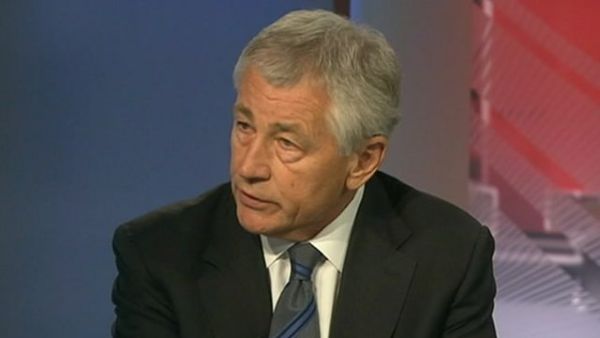Former Nebraska US Senator Chuck Hagel Vetted for State, Defense

As Secretary of State Hillary Clinton prepares to exit her post, a few names have surfaced as potential successors. UN ambassador Susan Rice is facing stiff opposition from Senate Republicans John McCain, Lindsey Graham, and Kelly Ayotte, all of whom said they were "more disturbed" after their Tuesday meeting with her.
Another name is Massachusetts US Senator John Kerry. In a sign of the different political environment today versus 2004 when he was trying to become the nation's commander-in-chief, Republican Senator Lisa Murkowski indicated that Kerry "would do a great job," as the nation's top diplomat.
Perhaps the most intriguing name being vetted for an Obama administration post is former US Senator Chuck Hagel, a Republican from Nebraska.
A veteran of the Vietnam War, Hagel worked on the Hill as a staffer, and earned millions as the co-founder and CEO of Vanguard Cellular before moving back to Nebraska and winning his first US Senate election in 1996 over then-Governor Ben Nelson.
In the Senate, Hagel served on the Foreign Relations Committee and declined to run for re-election in 2008 after serving two terms. Today, he is a Distinguished Professor of National Governance at Georgetown University and he also serves as the chairman of the Atlantic Council and is co-chairman of President Obama's Intelligence Advisory Board.
During his time in the Senate, Hagel was a reliable foreign policy hawk, voting for the Patriot Act and the 2003 invasion of Iraq, but he fell out of favor with his party when he began openly criticizing the war.
By 2006, Hagel was calling Iraq "an absolute replay of Vietnam" and in 2007 and 2008 he told Republicans to "quit talking about" the counterinsurgency strategy of General David Petraeus, and instead focus on what lawmakers were going to do "for the next four years to protect the interest of America and our allies and restructure a new order in the world."
A potential candidate for either state or defense, Hagel would likely win confirmation and lend a notion of bipartisanship to an administration that has seen the exit of Republicans Robert Gates from Defense, Petraeus from the CIA, and soon Ray LaHood from Transportation. Like Obama, Hagel is not explicitly anti-war, but a player who values consensus in foreign policy as well as correcting bad policies.
In an interview with Al Monitor, an online journal devoted to the Middle East, in which he declined to state whether he is still a Republican, Hagel praised Obama's handling of Syria:
"I think the president is playing this exactly right. We cannot be the tip of the spear under any circumstances. This is not Libya and even Libya was a coalition . . . If there is some military intervention, it has to come from the region. The Arab League . . . I don't think it can be a NATO-led element."
Hagel's post in the Obama administration would also mark a continuing shift of internationalist foreign policy thinkers from the Republican Party to the Democratic Party, a trend that was noticed by Jonathan Rauch of the New Republic this summer.
With the near dominance of neoconservatives in GOP foreign policy thinking, realists and internationalists of the old Republican school of thought have had much less influence and, as a result, are migrating. Republican veterans Colin Powell, Lawrence Korb, Lawrence Wilkerson, and former ambassador to the Soviet Union under President Ronald Reagan, Jack Matlock, all identify more closely with the Democrats because of their foreign policy views.
Chuck Hagel would be the latest figure associated with the GOP, a party once favored by Americans in the conduct of foreign policy, to work with the Democrats. He would also provide continuity and consensus in President Obama's second term foreign policy.




